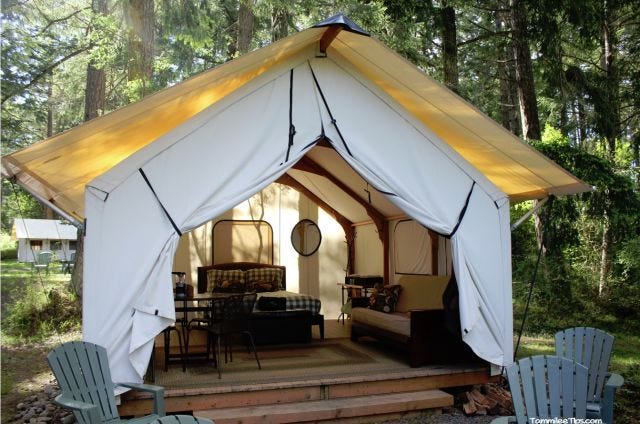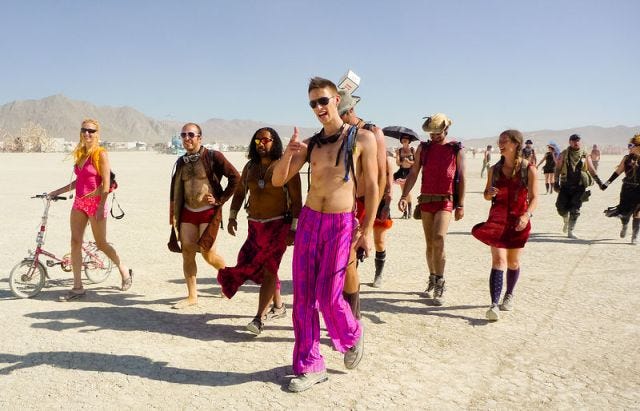So What, Who Cares (vol 2, issue 77) Who wants to live the glamp-orous life?
Hello! Welcome to the end of the first week of the new SW,WC schedule. How's it working out for you? Let me know via email or Twitter.
*

Ten years ago, the word glamping first appeared in the British press. For those of who can't automatically sunder portmanteaus into their preceding origins, "glamping" is short for "glamorous camping," the type of outdoorsy activity where it seems perfectly reasonable to pay someone at least $2000 to deliver 400-thread count sheets and a bed to an outdoorsy location somewhere in California.
Now, we live in a world where Sunset magazine has a glamping squad to advise you on the best porch for your premiere campsite and, as Outside magazine contributing editor Christopher Solomon notes, some state parks have begun setting aside prime "public" camping spots for glamping services that then stock them with high-paying clients.

So what? There's gold in them thar artisanal yurt-covered hills. Glamping is part of a larger shift in recreational culture -- a shift that includes massive outdoor events like Coachella and Burning Man and the rise of athleisure ("athletic leisure") as the way Americans dress -- and what that means is camping is no longer a matter of going out into the wilderness because you wish to live deliberately, sturdily and Spartan-like, reducing life to its lowest terms.
Camping is a social scene, one that made $37.7 billion in clothing sales alone last year and had approximately 201 million people participating at some level. So expect more glamping experience as the idea of taking your stylish life into a rustic setting gets more aggressively marketed to a wider consumer base.
Who cares? People who like parks and maybe do not have a lot of money to keep up with the rise of fee-based access to formerly-cheap public parks.
You will recall that there has been only one new national park created since 2009 (vol 1, issue 35) and a persistent, low-key worry among conservationists is that a one-two of political gridlock + young people increasingly distanced from nature will imperil the parks' future among generations who could not care less about places they have not visited. There's also an economic component to park access: as the Outdoor Foundation found out, 58% of people who routinely engage in outdoor activities have an annual income of $50,000 or higher.
Glamping doesn't address any of the fundamental issues around the lack of park attendance among growing segments of an increasingly urbanized America or a lack of outdoor activity among kids today (vol 2, issue 26), nor does it make the outdoors more accessible to households making less than $50,000 a year -- it just introduces a model of parks where some glampers are more equal than others.
*
Your pop culture note of the day: As a mass media fan, I've had a lot of fun watching the mainstreaming of remix culture and how it can be deployed in both political and pop-culture contexts. So let me share some of the mashups that have been making me laugh lately:
The Marvel 99 mashups, which take stills from the Marvel Cinematic Universe properties and transpose quotes and situations from Brooklyn 99.

The Grand Overlook Hotel, which mashes up footage from The Shining and The Grand Budapest Hotel. Both The Shining and Wes Anderson have spawned hilarious recontextualizations and riffs: I especially love the SNL sketch "The Midnight Coterie of Sinister Intruders" (this behind-the-scenes blog post details the insane amount of care that went into a clip which was shot and edited in just under two days) and there is, of course, the now-classic recut movie trailer "Shining" done by Robert Ryang.
(For the flip side of that, see Frozen recut as a trailer for a horror movie, as done by Bobby Burns.)
Another classic recut trailer is 10 Things I Hate About Commandments, wherein Cecil B. DeMille gets the teensploitation treatment.
For more on remix culture as a modern reflection of the humanities and fine arts, read this essay (which has lots of links to remixes) or Lawrence Lessig's Remix: Making Art and Commerce Thrive in the Hybrid Economy.
And if you've seen Pitch Perfect 2, you've seen a plotline that's set into a motion when a character pushes back against remixes by pointing out that creativity requires an element of originality. I'm wondering if this is going to presage a cooling of remix culture or if this is the rambling of the old guard. Your thoughts? Share them via Twitter or email.
*****
Are there typos? I apologize in advance. The only editing class I did not get an A in was copyediting.
Did you miss an issue of So What, Who Cares? The archive is here.
Would you like a run-down of all the books and other pop culture picks ever mentioned in this newsletter? Then check out the Pinterest board. (Note: None of the links are affiliate links; I do not make money off anything I link to.)
If you really like So What, Who Cares?, tell a friend to subscribe.

